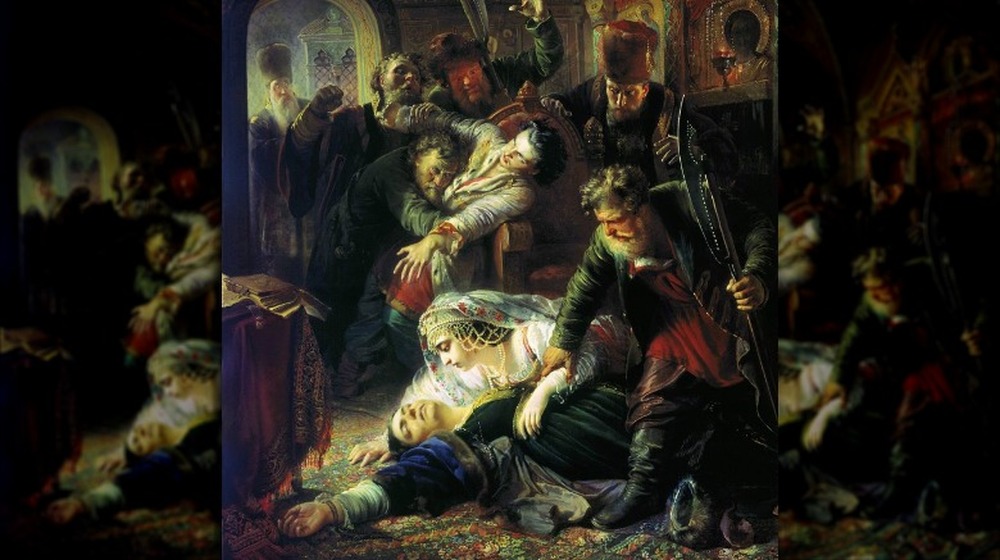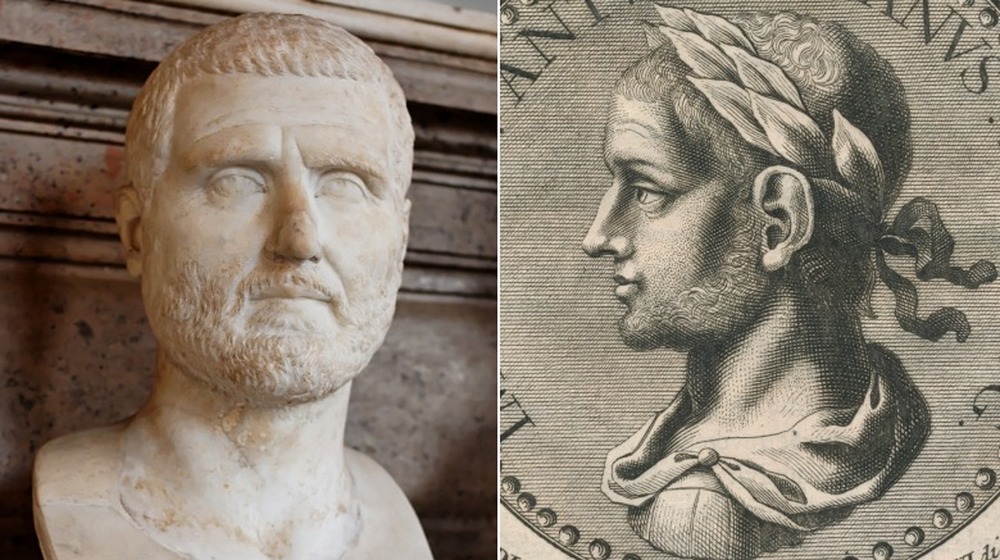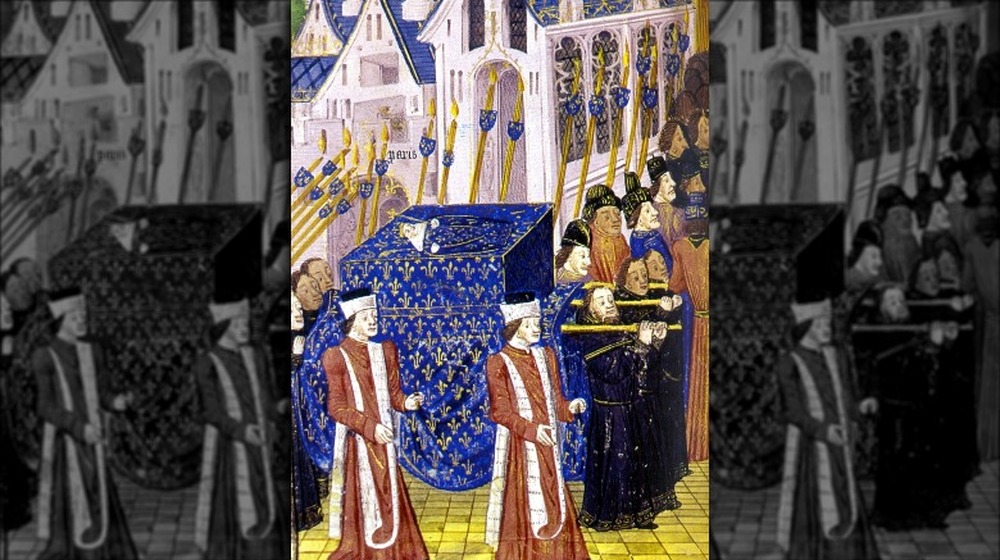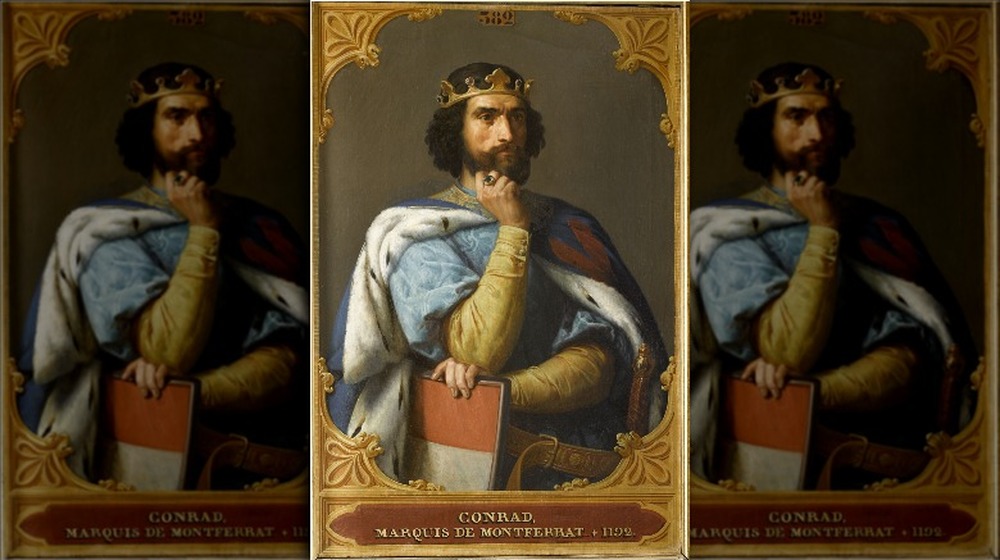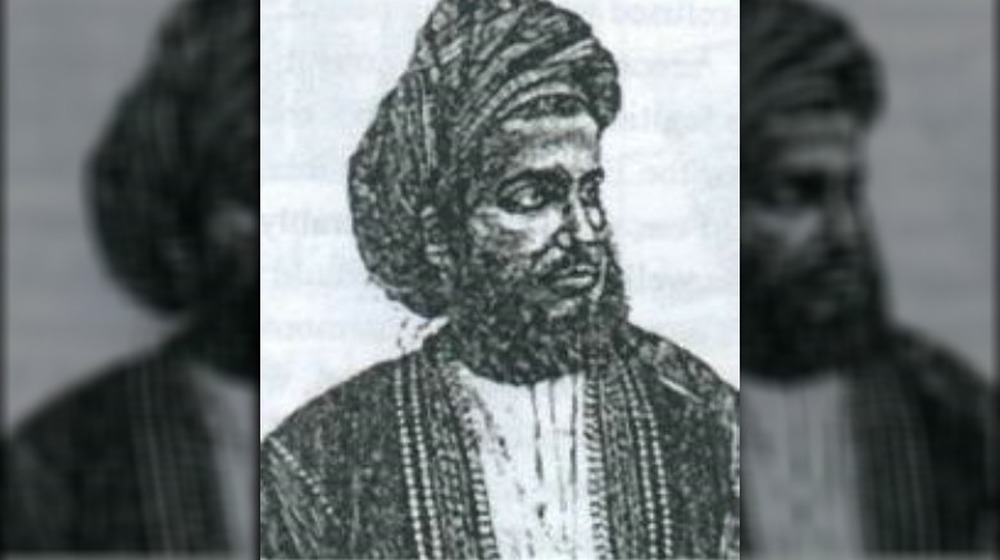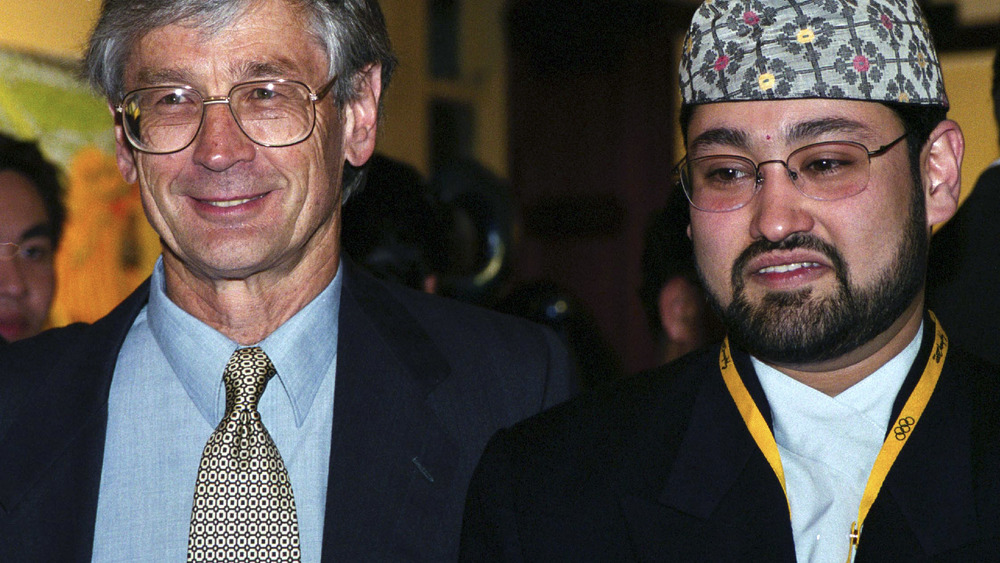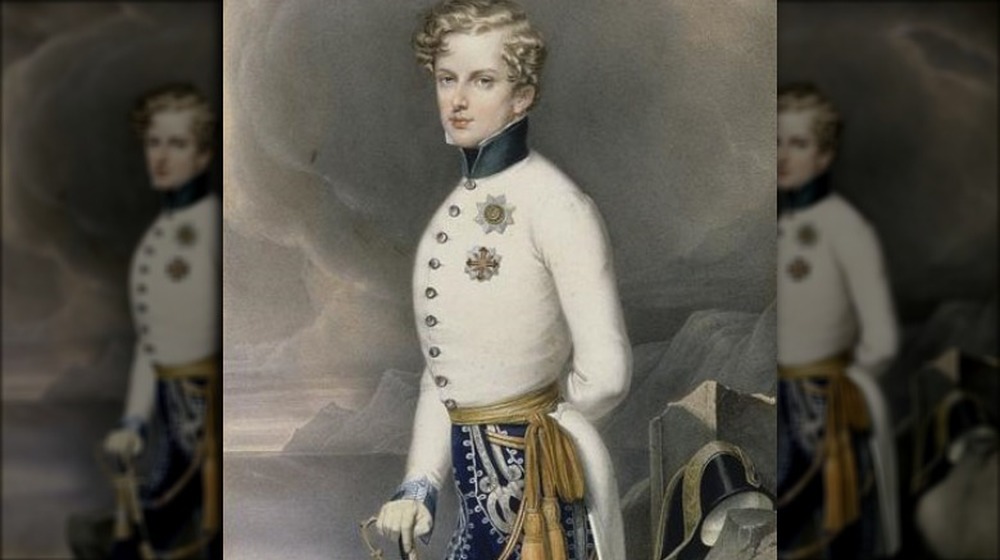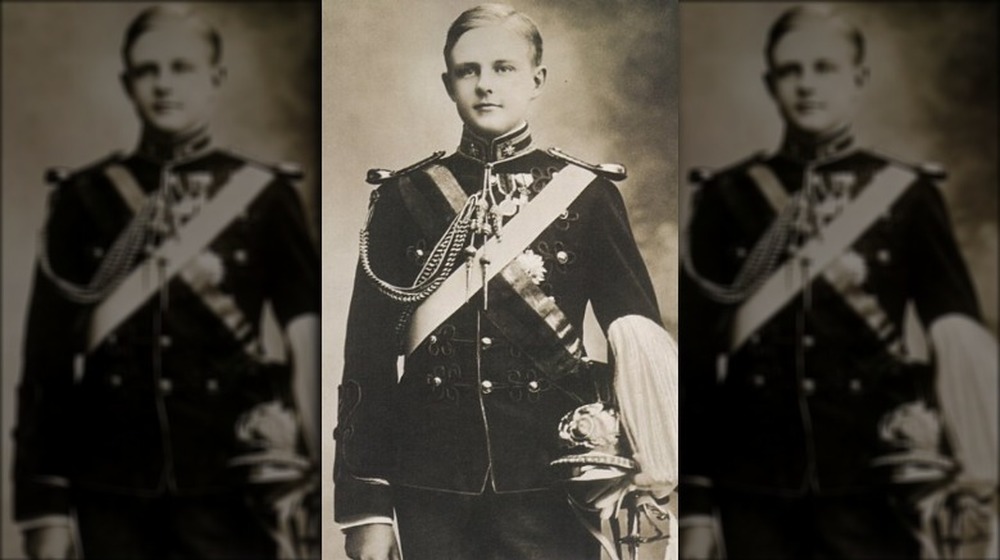The Tragic Stories Behind The Shortest Reigns In Royal History
Many scientists argue that it's a sense of self that sets humans apart from animals, and according to Aeon, that's pretty much all we know about our own consciousness. It's gone from the stuff of philosophy to science, and it's kind of a double-edged sword. Sure, being self-aware is pretty cool, but it's also what makes us very aware of all our mistakes, errors, and oopsies.
It's bad enough when we screw up on what's really a small scale: In a few months, no one's going to remember that time the kitchen almost got set on fire, or the coworker who got a glimpse of "that" photo.
But what happens when these everyday tragedies are written large and clear on a national — or even international — scale? Well, there are a whole bunch of royal heads of state who had very short reigns due to unfortunate circumstances and super-poor choices. Some of their stories are, in hindsight, epic, but look at it this way: If few remember their names, what does that mean for how quickly normal little mistakes are going to be forgotten?
So, let's talk short, tragic reigns.
Didius Julianus: 66 days
Anyone who's seen a production of Shakespeare's Julius Caesar knows how dangerous the job of Roman emperor was, and Marcus Didius Severus Julianus found that out for himself in the year 193, when he reigned for just 66 days.
According to Livius, Didius Julianus had a massively successful career as a prefect and general under the famous Marcus Aurelius. But things were not well in Rome: Commodus was killed by a group of conspiring senators and replaced by Pertinax, who lasted 86 days before he was killed in a military uprising and beheaded by some soldiers, who then carried his head around on a big stick. The murder, says Livius, was accidental. While that might not seem like the sort of thing that anyone might want to voluntarily step into, Didius Julianus did just that. Pertinax didn't name a successor, so Didius Julianus strolled in and said he was emperor, and everyone pretty much just said, "Well, all right then."
Except for Septimus Severus. When he heard about the murder and self-appointment of the new emperor, he declared he was emperor and then rounded up his men and headed to Rome. By the time he got there, the Senate already knew their soldiers weren't going to fight the man rapidly approaching, so they bailed, and just in time — an assassin sent by Severus killed and beheaded Didius Julianus (via the Ancient History Encyclopedia), and accounts suggest he was very surprised.
Fyodor II: 58 days
Russian history remembers the period between 1598 and 1613 as the Time of Troubles, and in a nutshell, it started with the untimely death of Fyodor I. When he died without an heir, that kicked off a succession debate (via Lumen Learning), and among the contenders were the so-called False Dmitrys. Hold on, because this is going to get weird.
The False Dmitrys were a series of pretenders who claimed to be the prince Dmitry (heir of Ivan the Terrible), who Headstuff notes had been killed as a child. The False Dmitrys basically had the support of Poland and Russian rebels who thought it was time for a bit of a change ... which brings us to Fyodor II. He was put on the Russian throne on April 23, 1605, and according to Britannica, the first False Dmitry was ready and waiting.
Fyodor II — who was just 16 years old at the time — just as quickly lost the support of the military, and when his mother stepped in to try to fix things, that irked the heck out of the Russian aristocracy, who, in turn, encouraged a full-blown riot. Rioters killed both Fyodor II and his mother in early June, and just two months into Fyodor's rule, the throne was wide open to be occupied by the first pretender.
Sweyn Forkbeard: 40 days
Remember that time England was ruled by a Viking king? No? Not many people do, because according to historian Darron Childs (via the BBC), "It's hard to make a big thing of someone so bad — it would be a bit like celebrating Hitler." That's not something that should be thrown around lightly, so who was this guy?
Sweyn Forkbeard was declared king of England on December 25, 1013, after kicking out his more well-known father, Harold Bluetooth. There was a ton of killing, impaling, and hanging people to die by various body parts (and not the first body parts that come to mind, either). Childs calls Sweyn's push to power "a campaign of robbery and casual cruelty," so maybe it's not that surprising that he was mysteriously killed just 40 days after declaring himself king.
His death came on February 3, 1014, and there's a whole bunch of stories about what happened. Some suggest it was just a simple fall from a horse (via Historic UK), others suggest he was murdered by someone within his own court, and still others say that St. Edmund himself returned from beyond the grave to put an end to Sweyn's brutal reign. That wouldn't be entirely surprising ... especially considering that he was followed by his son, Canute the Great, who was notable for switching to Christianity and being not quite as stabby.
Gordian I & II: 22 days
Maximinus Thrax might sound like the name of an MCU villain, but it was also the actual name of a Roman emperor who had a reign that lasted just three years starting in 235 ... but we're not here to talk about him.
Thrax was obsessed with his military campaigns (maybe he was from the MCU?), to the point where the Senate essentially got sick of his spending and decided to appoint someone else as emperor. History Cooperative says that his replacements were Gordian I and II, a father-and-son team who cemented their claim to the throne with the murder of Vitalianus, the commander of the praetorians and lapdog of Maximinus Thrax.
The Gordians immediately started doing things like disbanding the secret police, declaring the former emperor an enemy of the state, and preparing to fend off a military invasion ... which immediately happened with the help of a governor loyal to their predecessor, who just happened to be in the area.
It was Gordian II who led the charge against the advancing army, so he was the one to die first. When word of his death got back to his father, Gordian I immediately committed suicide. They had reigned for just 22 days.
Jane Grey: 9 days
We're getting into single digits with Jane Grey, who was declared queen of England on July 10, 1553. She reigned for just nine days, and that's not even the most tragic part — sadly, Smithsonian Magazine says that she didn't even want to be queen in the first place.
Grey was caught up in the stranger-than-fiction, soap-opera style drama that was the Tudor family, and she had been groomed to not only be queen but a figurehead for the country's relatively new faith of Protestantism. At the time she was married and then told she was going to be queen, she was just about 16 years old — and she fainted at the news.
Grey's entourage, led by the Duke of Northumberland, installed her in the Tower of London, where they thought it should be safe enough for her. But they hadn't expected her rival, Mary Tudor, to gain so much support so quickly. Just nine days after Grey became queen, the royal council revoked their statement and named Mary as the official Tudor heir, and the Tower of London became not a seat of power but a prison.
Grey was held there until February 12, 1554, when she was taken to the Tower Green and executed. Her last words were (via Historic UK), "Lord, into thy hands I commit my soul."
John I (John The Posthumous): 5 days
Being born into royalty didn't automatically give everyone a ticket to an easy life of luxury. Take France's John I.
He was the son of Louis X (who, The British Museum says, was also known as Louis the Stubborn) and was born on November 15, 1316 — after the death of his father. He earned the nickname John the Posthumous and was crowned king immediately at his birth, but tragically, Britannica says that he died just five days later.
While that was, of course, the sad end to John I's reign, that's not entirely the end of the story. Fast-forward to 1356, and the royal court of France suffered a bit of an upset in the form of a claim that John I hadn't died at all but had instead been swapped for another baby and raised as a commoner for ... reasons. The Telegraph says that Giannino di Guccio Baglioni claimed to have been told of his "true" history by a man named Cola de Rienzo, who had died before he could complete his mission of seeing the "true" monarch ascend the throne.
Sounds like the sort of thing that people would just kind of roll their eyes at, right? Many did — Giannino ("Little Johnny") appealed to the Hungarian royal court for help in reclaiming his so-called birthright but was sent away. He only managed to put together a small army of mercenaries to harass the French court, but when Jean II rose to power, he was largely forgotten.
Conrad of Montferrat: 4 days
When it comes to the Crusades, Western history tends to talk a lot about the Western leaders, like Richard the Lionheart. Less popular are the leaders of the other side, like Conrad of Montferrat, who was briefly Conrad I, king of Jerusalem, in 1192.
According to HistoryExtra, Conrad was pretty awesome — he was the sort of guy who, when the question, "Who do we want to lead us?" came up, everyone pointed to him and said, "That guy!" To put it in D&D terms, he scored high in wisdom and intelligence and had the strength of a barbarian and all the charisma of a bard. It wasn't just boot-licking chroniclers that said it, either — he was so widely popular that he was elected king of Jerusalem during the Third Crusade by a landslide.
Unfortunately for Conrad, that made him a target. He'd been having lunch with his friend and was walking back to his own house when he was attacked, stabbed, and killed. One of the assassins was killed instantly, and when the other was tortured for information, he spilled the beans: He was a member of the Assassins, the hashish-smoking killers-for-hire that occupy that weird place in history that's half mythical.
Conrad was king for just four days before he was murdered, and yes, Richard the Lionheart was ultimately blamed for hiring the mercenary assassins.
Khalid bin Barghash: 3 days
Not only does this tale involve one of the shortest reigns in history, but it also involves the shortest war in history. It's a record that's unlikely to be broken, and Historic UK says that the Anglo-Zanzibar War of 1896 lasted just 38 minutes.
The story takes longer to tell than the war took, but in a nutshell, it started when control of Zanzibar went to the British, who decided to install their own sultan. He died about three years in, and the running theory is that he was poisoned by his cousin, Khalid bin Barghash. Pro tip: If you want to kill someone for their position and avoid suspicion, don't move into their palace and declare yourself sultan before the body is even cool.
Khalid started gathering his troops as a precursor to taking on Zanzibar's British overlords, and it was just a matter of hours before the British fleet stationed in the nearby harbor got the go-ahead to "adopt whatever measures [they] may consider necessary." Khalid responded by saying that he was sure they wouldn't fire on the sultan's palace, and then — perhaps predictably — the British did exactly that.
Just 38 minutes later, the new sultan's flag was down, 500 of his men were dead, and Khalid fled. He wasn't captured until 1916, and he was exiled first to Saint Helena and then to East Africa, dying in 1927.
King Dipendra: 3 days
In June 2001, shocking news started to trickle out of the Nepalese palace: King Birendra, Queen Aishwarya, and eight other members of the royals' inner circle had been killed by a mysterious gunman.
On June 4, The Irish Times announced — to widespread confusion — that Nepal had named a second king in just two days: Prince Gyanendra was now regent, following the appointment and death of Dipendra (right above), the crown prince. Days after that, it still wasn't clear what had happened, but several journalists were reported to have been arrested after publishing a story that named the man behind the massacre: Crown Prince/King Dipendra himself.
Stories varied, but the Association for Diplomatic Studies & Training later explained that Dipendra, outraged that his family had denied him the right to marry the woman he'd fallen in love with (because her grandmother had been a concubine), simply walked into the palace dining hall and started shooting.
He then attempted to commit suicide but ended up in a coma — which is when he was appointed king of Nepal. He remained in the coma for three days before he died, and the massacre kick-started a complete overhaul of Nepal's political construct.
Napoleon II: 2 days, then 20 days
The infamous Napoleon Bonaparte had one legitimate son with Marie-Louise in 1811, and he was predictably named Napoleon II, or Napoleon Francois Charles Joseph. (For the sake of the story and simplicity, we'll call him Baby Napoleon.) According to The Foundation Napoleon, Baby Napoleon was just three years old when he became the French emperor for the first time, after his father abdicated. Unfortunately (or perhaps fortunately) for him, Napoleon added to his abdication rules a few days later and officially removed all of his descendants from being in the running for emperor.
That must have been a huge bummer, and it's not the end of the story. Napoleon didn't go away completely and returned in 1815. Baby Napoleon was officially a prince again, and when his father was defeated at Waterloo, he was emperor ... again. That lasted for just 20 days, and when the French aristocracy refused to recognize his rule, he headed to Austria and was taken under the wing of Francis I, the Austrian emperor and his grandfather. He was raised as a prince, and while he was officially the French heir, he never took power and died of tuberculosis at 21 years old.
Vira Bahu I: One night
There isn't too much information available on Sri Lanka's King Vira Bahu I, but that's not entirely surprising — he ruled for just one night.
According to Sri Lankan History, Vira Bahu was named king on the night of his father's death in 1196. His father, Nissanka Malla, had been on the throne for nine years, and according to Lakdiva, he did important things like overseeing the unification of Buddhist sects and building some of the era's most important buildings. Or, at least he took credit for doing those things, which isn't quite the same.
At any rate, his son died at dawn on the morning following his ascension to the throne. The killer was a man named Tavuru Senevirat, who said he did it because there was no way the son could live up to the legacy of the father. He was also the military's commander-in-chief, and the action ushered in a period of military rule in Sri Lanka.
Louis Antoine de Bourbon (Louis XIX): 20 minutes
France isn't just known for their croissants and pastries. They're also known for their revolutions. One was happening in 1830, and the so-called July Days brought about the abdication of Charles X (via Britannica).
When he abdicated, the University of St. Andrews says that the legit heir was his oldest son, Louis Antoine. When Charles stepped down, he became Louis XIX ... for all of 20 minutes before abdicating himself in favor of the nine-year-old Henri de Bourbon.
Louis XIX was no slouch, and by the time he rose to the throne, he already had a decorated military career and was widely known to be devoted to his family. But the idea was that by handing the monarchy off to a child, Louis XIX was hoping to sort of hit the reset button and introduce a king that everyone could get behind. He spent the rest of his life in exile and died 14 years later.
Luis Filipe: 20 minutes
King Carlos I took the Portuguese throne in 1889, and when he came to power, Portugal wasn't a great place to be. There was all kinds of unrest and corruption, which, coupled with a devastating financial recession, led to an open revolt. In an attempt to regain control, Carlos decided to try to overthrow the Parliamentary government and make it a dictatorship, but it definitely didn't go as planned.
According to Sky History, King Carlos and his son, Luis Filipe, just shy of 21 years old, were riding through Lisbon when they were targeted by an assassination attempt. The open carriage probably made it pretty easy, and Carlos was killed instantly. Luis Filipe was shot and mortally wounded even as the carriage made a run for it, and according to Grand Circle Travel, it was a 20-minute mad dash for safety ... during which time the heir apparent had become king.
Also in the carriage were Luis' mother and younger brother, Manuel (who was also wounded in the attack). In spite of Manuel's best efforts, Luis died as he was being removed from the carriage, having been king for just 20 minutes.


